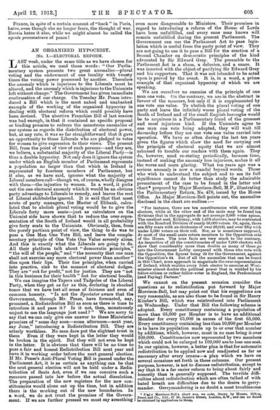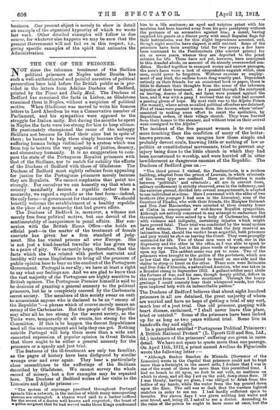AN ORGANIZED HYPOCRISY. ;No. 1.—ELECTORAL REFORM. T AST week, under
the same title as we have chosen for this article, we used these words : "Our Parlia- mentary system presents two great anomalies—plural voting and the endowment of one locality with twenty times the voting power possessed by another. Therefore the anomaly which is injurious to the Liberals must be altered, and the anomaly which is injurious to the Unionists left without change." The Government has given immediate confirmation of our charge. On Tuesday Mr. Pease intro- duced a Bill which is the most naked and unabashed example of the working of the organized hypocrisy in dealing with electoral reform which could possibly have been devised. The abortive Franchise Bill of last session was bad enough, in that it contained no specific proposal or binding promise to redress the monstrous anomalies of our system as regards the distribution of electoral power, but, at any rate, it was so far straightforward that it gave an opportunity to those Liberals who are pledged to votes for women to give expression to their views. The present Bill, from the point of view of such persons—and they are, we believe, a substantial majority of the Liberal Party—is thus a double hypocrisy. Not only does it ignore the system under which an English member of Parliament represents a population no larger than that which in Ireland is represented by fourteen members of Parliament, but it also, as we have said, ignores what the majority of Liberal members call—though we, of course, wholly disagree with them—the injustice to women. In a word, it picks out the one electoral anomaly which it would be an obvious party advantage to Liberals to remedy, and leaves the rest of Liberal shibboleths ignored. It is said that that most acute of party managers, the Master of Elibank, calcu- lated that to abolish plural voting would be to give the Liberals forty more seats—just as calculators on the Unionist side have shown that to reduce the over-repre- sentation of the South of Ireland would in all probability give forty seats to the Unionists. Obviously, then, from the purely partisan point of view, the thing to do was to pass a One Man One Vote Bill, and leave the comple- mentary principle of One Vote One Value severely alone. And this is exactly what the Liberals are going to do. All their platform talk about "democratic principles," "the will of the people," and "the necessity that one man shall not exercise any more electoral power than another" dies upon their lips. Their fine principles, when carried into practice, sink to the meanest of electoral dodges. They are " out for profit," not for justice. They are "not in this business for their health" but for electoral boodle.
We can imagine the Tapers and Tadpoles of the Liberal Party, when they get as far as this, declaring in shocked tones that we have lost all sense of fairness and even of common honesty. "Is not the Spectator aware that the Government, through Mr. Pease, have forecasted, nay, promised, a Redistribution Bill as soon as there is time to introduce it and pass it ? Is it not, then, monstrously unjust to use the language just used ? " We are sorry to say that we can only give one answer to these Ministerial promises of "some day soon—some afternoon—next year, say June," introducing a Redistribution Bill. They are utterly worthless. No man dare put the slightest trust in them Even if they were kept in the letter they would be broken in the spirit. But they will not even be kept in the letter. It is obvious that there will be no time to pass a fair and honest Redistribution Bill next year and have it in working order before the next general election. If Mr. Pease's Anti-Plural Voting Bill is passed under the Parliament Act, it is as certain as anything can be that the next general election will not be held under a Redis- tribution of Seats Act, even if we can conceive such a measure passed into law before the actual dissolution. The preparation of the new registers for the new con- stituencies would alone eat up the time, but in addition there is the marking out of the new boundaries. In a word, we do not trust the promises of the Govern- ment. If we are further pressed we must say something even more disagreeable to Ministers. Their promises in regard to introducing a reform of the House of Lords have been unfulfilled, and every sane man knows will remain unfulfilled during the present Parliament. The Government can use the Parliament Act to pass legis- lation which is useful from the party point of view. They are not going to use it to pass a Bill for the erection of a Second Chamber on democratic principles of the kind advocated by Sir Edward Grey. The preamble to the Parliament Act is a sham, a delusion, and a snare. It was inserted with the object of pacifying Sir Edward Grey and his supporters. That it was not intended to be acted upon is proved by the event. It is, in a word, a prime example of that organized hypocrisy of which we are speaking. We are ourselves no enemies of the principle of one man one vote. On the contrary, we are in the abstract in favour of the measure, but only if it is supplemented by one vote one value. To abolish the plural voting of one party and leave the infinitely worse plural voting of the South of Ireland and of the small English boroughs would be to acquiesce in a Parliamentary fraud of the grossest and most injurious kind. If the Unionists agree to one man one vote being adopted, they will wait till doomsday before they see one vote one value carried into operation. We have so often during the last ten years given the figures which show the need for carrying out the principle of electoral equity that we are almost ashamed to trouble our readers with them again. They do, however, need re-stating periodically, because time, instead of making the anomaly less injurious, makes it all the worse and more glaring. What ten years ago was a serious anomaly is now a scandal beyond words. Those who wish to understand the subject and to see its full significance cannot do better than study the admirable presentment of the case to be found in the letter and chart* prepared by Major Morrison-Bell, M.P., illustrating the Parliamentary Return, No. 478, issued by the Home Office. As Major Morrison-Bell points out, the anomalies disclosed in the chart are endless :- "For instance, there are ten constituencies with over 30,000 electors, while at the other and of the scale may be found ten divisions that in the aggregate do not average 3,000 votes apiece. The smallest seat, Kilkenny, with 1,676 electors, may be contrasted with the Romford Division of nearly 58,000 voters. Or, again, there are fifty seats with an electorate of over 20,000, and over fifty with under 5,000 voters on their roll. Nor, as is sometimes supposed, do most of the small seats return members to the Opposition side of the House. The true facts are very much to the contrary. An inspection of all the constituencies of under 7,000 electors will show that considerably more than double as many of these go into the Government Lobby compared with those who vote with the Opposition, the figures being 93 for the Government, against the Opposition's 44. But of all the anomalies that can be found in this Chart, none approach in magnitude the over-representation of Ireland, which enables every Irish elector to exercise at West- minster almost double the political power that is wielded by his fellow-citizen or rather fellow-voter in England, the Predominant (and Paying) Partner."
We cannot on the present occasion consider the questions as to redistribution put forward by Major Morrison-Bell, but may point out that his suggestions are very reasonable, as are also those to be found in Sir Henry Kimber's Bill, which was reintroduced into Parliament on Wednesday. Under that Bill the following scheme is adopted. Every constituency containing a population of more than 65,000 per Member is to have an additional Member for every 65,000 in excess of the first 65,000. Every constituency containing less than 50,000 per Member is to have its population made up to or over that number by additions, which, however, must in no case bring it over 100,000. Constituencies now represented by two members which could not be enlarged to 100,000 are to lose one seat. In our opinion, however, a better plan is that for automatic redistribution to be applied now and readjusted as far as necessary after every census—a plan which we have on several occasions set forth in these columns. Our present purpose, however, is not to discuss redistribution, except to say that it is a far easier reform to bring about fairly and honestly than is generally supposed. The terrible diffi- culties about redistribution which are often talked of with bated breath are difficulties due to the desire to gerry- mander. Gerrymandering is no doubt a most troublesome • ll'ajar Morrison-BeIrs chart was, we note, drawn by Messrs. Sifton, Praed and Co., Ltd., 437 St. James's Street, London, S.W., and can no doubt be obtained by application to thew. business. Our present object is merely to show in detail an example of the organized hypocrisy of which we wrote last week. Other detailed examples will follow in due course, for whatever else happens we may be sure that the present Government will not fail us in this respect, i.e., giving specific examples of the spirit that animates the Administration.











































 Previous page
Previous page